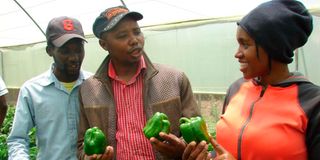Bring the youth into agricultural value chain through positive experiences

Aberdare Life Impact Youth Group members in Kinangop, Nyandarua, at their capsicum greenhouse. One challenge in engaging the youth is linked to perceptions that portray agriculture as unattractive thus discouraging the youth from joining.
A fortnight ago, I pointed out that over 75 per cent of Kenya’s population is below the age of 35. While the youthful population may yield a demographic dividend, it is worth noting that the average age of the Kenyan farmer is over 60, which is worrying, from a food security perspective.
The youth are trooping to urban centres in search of elusive jobs. This rural-urban migration is a canary in the coal mine, a warning to potential future food insecurity.
To deal with this imminent problem, the youth should be brought into our agricultural cooperatives by placing them in the driver’s seat and by modernising our farming systems to give them a chance to practice what they have learned in school.
There are efforts in other countries to do that. In Guatemala, for instance, interventions have led more youth to participate in agricultural value chain—in the coffee sector, for instance. Bringing in more youth would inject new vigor and energy. However, we should first put in place a system to build and sustain the attractiveness of agriculture as a viable source of income among the youth.
Create opportunities
A recent eleven country study across Africa by Heifer International (“The Future of Africa’s Agriculture: An Assessment of the Role of Youth and Technology”) points to what may help trigger this. In particular, the findings suggest that “efforts geared towards providing financial capital, capacity building and access to land will spur the youths’ interest in agriculture.” It further points out that innovation in agriculture will act as a pull factor as it will create openings for young people to take part, increase productivity for smallholder farmers and create a positive economic climate that benefits businesses.
Bringing youth into the agricultural value chain calls for a multifaceted approach, including shifting perceptions regarding farming, early positive exposure to farming, interventions to increase profitability from farming, and engaging them in solving agricultural problems. In addition, agricultural cooperatives should also address governance barriers, which systematically discriminate youth and women from leadership.
One challenge in engaging the youth is linked to perceptions that portray agriculture as unattractive, thus discouraging their participation. To change this, cooperatives could infuse modern technology, such as use of mobile phone technology, to direct data-driven farming practices.
Productive activity
Smart mobile phones are widely available and are a most favoured form of communication by the youth. In addition, the youth themselves can use the many social media platforms to drive recruitment of fellow youth into farming. This will facilitate agricultural cooperatives to reach the youth directly and positively influence them to go into farming.
The negative perceptions are partly fed by how the youth get exposure to farming. Farm work is often used as punishment rather than as a gainful and productive activity. Youth should be positively socialised, through schools and at family level, into farming to encourage more of them to join.
In school, rather than using farm work as punishment, the students could be provided with experiential agricultural education, which would positively reinforce agriculture as a viable occupation.
At the community level, agricultural cooperatives could provide farm field days using exemplar farms to nurture interest in farming.
Retaining the youth on the farm calls for models that bring increased profitability and productivity through farming. Deploying ICT technologies will modernise farming practices and inject more precision into decision making, which would improve farm experience. Furthermore, since the youth are tech-savvy, they are more likely to be early adopters of precision technologies in farming; a win-win situation for Kenya’s food security.
Stable source of income
Finally, meet Orapeleng Nareetsile, a young software engineer from Botswana who joined farming because he could not get employment. He narrated his experience at a recent conference on social and solidarity economy enterprises held at the Cooperative University of Kenya. Now, Orapeleng had no idea about cooperatives until he googled it up.
After learning what a cooperative can do, he organised his unemployed graduate friends and they formed an agricultural worker cooperative. That cooperative now gives them a stable source of income. They have made on-farm innovations to manage input costs and increase their profit margins. They are a group of happy youths.
Their experience should spur interest from youth in Kenya.
Prof Nyamongo is the Deputy Vice Chancellor at The Cooperative University of Kenya. Email: [email protected]. Twitter: @Prof_IKNyamongo





